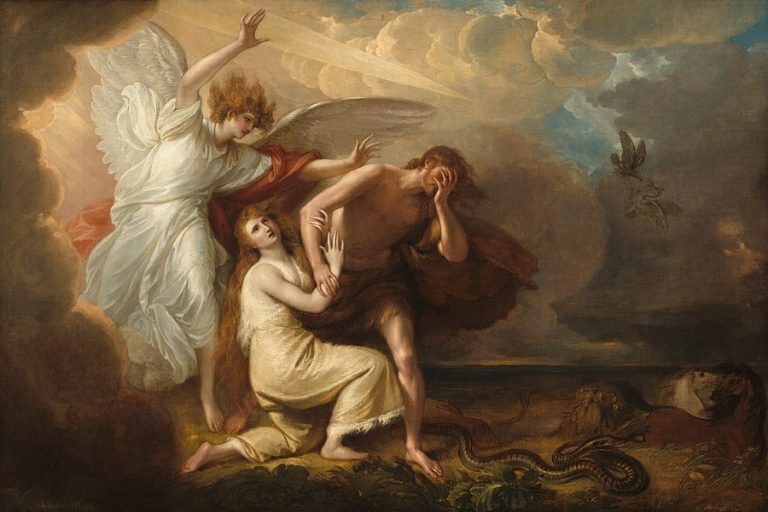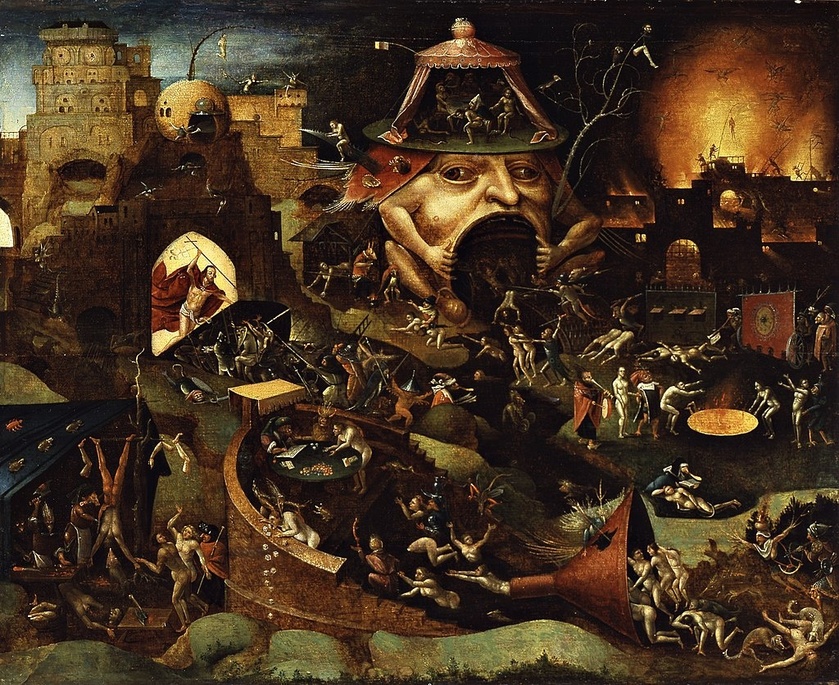
In one instant in the Garden of Eden, the entire trajectory of life changed for Adam and Eve. Upon that first, most-unfortunate decision, their natures had been damaged. What was once for them a peaceful life was now about to become utter chaos as they, having transgressed the law of God, are thrust out of Paradise into the bitter world surrounding. Life was good, nay, great at first. Endowed with many gifts, Adam and Eve would have been the envy of the town, should there have been one. These gifts included the following: immortality, impassibility, integrity, infused knowledge, and, finally, habitual sanctifying grace, which rendered them at one with the Lord, the Author and Giver of all good gifts. The Fall destroyed most of that, with the possible exception of infused knowledge, since what is stored in man’s memory is often not easily forgotten.
Still, God had a plan for redemption. In the third chapter of Genesis, He communicated it for the first time, and in the life and death of Jesus the Christ, it was fulfilled. Christ brought reconciliation and atonement to a wounded race. By His grace, we have access to this redemption and the consequent justification. Justification is one of the great mysteries of the Christian life, and it is often discussed by Catholics and non-Catholics alike. Here, I intend to focus not on the process of justification as such but rather the effect of it on man, namely: does justification reverse the Fall? I will argue a threefold answer. Firstly, I will argue that justification does reverse the Fall when we consider certain aspects of the situation both before and after Christ; secondly, that justification does not reverse the Fall in certain other aspects; and thirdly, that justification not only reverses but far exceeds the state of original justice in still another aspect. Let us begin right away.
As to the first point, it seems that justification does indeed reverse the Fall. The state of original justice included habitual sanctifying grace and a proper relationship between God and man. Justification through Christ restores man to a state of grace through the merits won on the Cross; this restoration is, quite simply, the opposite of what took place as a result of the Fall. Hence, the gift of grace granted through justification entails a reversal vis-à-vis the Fall. Further, since grace is considered a share in the divine life, and a sharing of life with another indicates a relationship set in right order, on this point also we can safely assert the effects of that first sin have been undone. The right relationship between God and man (and the rest of Creation, I might add) that was enjoyed by Adam is now given to those who abide in the new justice offered by Christ. Again, this is the opposite of the broken relationship caused by the Fall, and so it can rightly be called a reversal of it.
As to the second point, I am forced to admit that justification did not entirely reverse course. We are still bearing the burden of mortality, insubordinate passions, and suffering. These afflictions were the direct result of the Fall, as God told to Adam after he sinned. Adam’s loss of mortality was twofold, spiritual and physical. His spiritual death was the loss of sanctifying grace, which I covered above. The physical death is the result that lingers on even now. Despite the meritorious work of Jesus, we still struggle against physical death in this life. Many of us are deathly afraid of it too. Suffering goes along with this point. In the garden, Adam would have been impervious to suffering since his body was completely subject to his soul, and his soul was completely subject to God. A rightly ordered being would not have suffered as we do; ours is another lingering result of the Fall. The final aspect that was not reversed has already been hinted at: insubordinate passions. Prior to the Original Sin, as mentioned, Adam’s body was subject to his soul because his soul was subject to God. Once he had sinned, his soul was no longer totally responsive to God, and therefore it lost the ability (and the rights) to totally subdue his body. His passions raged, as ours do now, tempered only by circumstance or virtue hard-learned. These aspects of the Fall did not bounce back after justification.
Thirdly and finally, it seems appropriate to assert that for some of the consequences of the Fall, justification has restored them beyond what they were in the state of original justice. These would include three things, as far as I can tell. First, the gifts of the Holy Spirit have been given to those whom Christ has justified. These were not granted to Adam and Eve, and they seem to surpass the preternatural gifts even if they are not possessed by us in full. Second, we now have the ability to merit our eternal reward. Since Christ has bestowed His grace upon us and made us members of His Body, anything we do in grace out of love of God is a meritorious act that deserves recompense. Prior to justification, even our best works were not of the sort that could merit further grace from the Lord; but now, restored to friendship with God, our good works bear the stamp of Christ, and so they deserve an eternal reward. Third, justification has thrown open the doors of Heaven to all who persevere in God’s grace – to be able to live in Heaven was neither a preternatural gift nor a natural endowment to Adam. The Beatific Vision is the most splendid and gratuitous of these three just described. It is nothing short of wondrous; in his first letter to the Corinthians, St Paul reminds us Heaven is ineffable. This definitely exceeds a simple reversal of the Fall.
The effects of Original Sin were myriad. The damage done to mankind’s state of original justice was unspeakable. Adam, as representative man, merited for all his progeny the punishment due to his sin. But Jesus Christ, the New Adam, won back His people from the state of sin and restored us to grace. This justification was effective at reversing some of the effects of the Fall, and exceeding others, though it did not reverse everything. Allow me to raise one last point. It seems to me that, on the whole, justification is indeed a reversal of the Fall since on most counts, the features of the state of original justice have been restored or far exceeded. He would have been a curious Savior if He, as Almighty God, was unable (or unwilling) to deliver us back to the state of pristine human nature. It is a testament to the greatness and power of the Lord that He not only reversed the devastating effects of the Fall but gave us a higher form of participation in His divine life through the grace that comes by justification. Despite persistent mortality, suffering and disordered passions, we are much better off now, having access to the grace of Christ, than we were before He had come to reconcile the world to Himself. The only appropriate response to this gift is to humbly receive it, and to do everything we can to live in communion with He who is our very life.
(This brief essay was originally submitted during my graduate coursework at Franciscan University of Steubenville. In hindsight, it is not as thorough and refined as it could be; nonetheless, I believe it is still worth sharing.)















